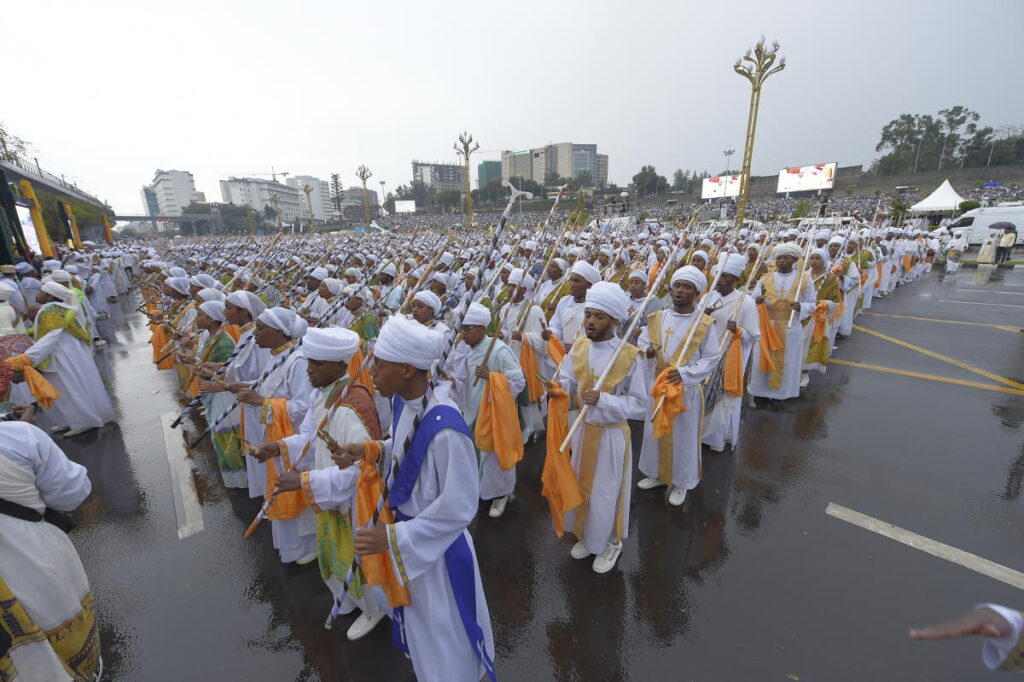ADDIS ABABA, Ethiopia (AP) — Thousands of Ethiopians gathered in the capital on Thursday to celebrate an annual religious festival marked by the lighting of bonfires, in accordance with the beliefs of the local Orthodox Christian faithful.
National celebrations of the festival, known as Meskel, traditionally take place in a square of the same name in Addis Ababa. It is one of Ethiopia’s most celebrated religious holidays, marked with rituals and merriment throughout the country.
The festivities last through Friday, a national holiday when believers attend church services and share intimate moments with their families.
In honor of Meskel — a word in the local Amharic language for “cross” — bonfires are lit across the country. In Meskel Square, the patriarch of the Ethiopian Orthodox Tewahedo Church lit a large fire on Thursday in the presence of thousands of worshippers in white costumes.
Throughout Ethiopia, crowds gather in public squares and churches to light similar bonfires made from piles of logs, dried leaves and grass. Prayers and religious ceremonies are followed by a feast of “kitfo”, a lean ground beef somewhat like steak tartare that is enjoyed as part of Meskel festivities.
According to church beliefs, the festival celebrates the cross on which Jesus was crucified and its recovery by Saint Helena, the mother of Emperor Constantine. The story goes that Saint Helena received a revelation in a dream in which she was instructed to light a bonfire and follow the smoke to find the cross buried in Jerusalem.
Meskel has been recognized by UNESCO as an Intangible Cultural Heritage of Humanity.
This year’s festival comes at a difficult time for Ethiopia, Africa’s second-most populous country and one of the world’s largest landlocked nations. Prime Minister Abiy Ahmed’s attempts to gain access to the sea through Somalia’s semi-autonomous Somaliland region have angered authorities in Somalia, who see the move as an act of aggression.
At the same time, Ethiopia is in conflict with Egypt over a large dam on the Nile River, which authorities in Cairo say will reduce their share of much-needed Nile water. The disputes have led to tensions in the Horn of Africa in recent weeks.
Abiy has also taken aim at the Orthodox Christian Church, which criticized him for apparent excesses by government forces in the brutal war in the northern region of Tigray, which ended with a peace deal in 2022. A new uprising erupted in 2023 when government forces tried to disarm local militias in the Amhara region, which shares a border with Tigray.
Some Meskel celebrants said the festival provides an opportunity to reflect on peace.
“The importance of the celebration of Meskel for Ethiopians is that we reflect on the idea of peace,” said Berhanu Admass, a deacon of the church. “This is to make us forgive and pray for our peaceful coexistence, as uniquely and beautifully defined for us by the hope that Meskel is and represents.”
A larger celebration of Meskel is expected on Friday in Gurage Zone in southern Ethiopia, where Meskel has long held special significance. The Gurage Zone administration said it expects hundreds of thousands of tourists to travel there.
Everton Gordon, a Jamaican-Canadian who previously celebrated Meskel in Canada, said celebrating the holiday in Ethiopia is a unique experience. The big bonfires “will be the highlight,” he said.
Ethiopian Azeb Bisrat and her children flew to Addis Ababa from Gonder, a city in Amhara that has seen heavy fighting in recent months. She said some members of her extended family were unable to travel for security reasons.
“As a large family, we often drove to Addis Ababa to take part in such an important ritual, but in recent years that journey has become almost impossible,” she said.
Luleseged Tadesse, a resident of CMC, a suburb of Addis Ababa, said that although he was unable to attend the large celebration in Meskel Square, he had mobilized neighbors, including Muslim Sudanese and Syrian refugees, to participate in the celebration. Those neighbors were escaping conflict in their countries.
“All the neighbors contributed to the festival what we could and we are going to light a bonfire, sacrifice a sheep and pray in our own religions for better days for Sudan, Syria and Ethiopia,” he said. “Such a celebration brings neighbors together, makes us act as a family and see the best in each other.”
___
Associated Press’s religion coverage is supported by the AP Newsletter cooperation with The Conversation US, with funding from the Lilly Endowment Inc. The AP is solely responsible for this content.







